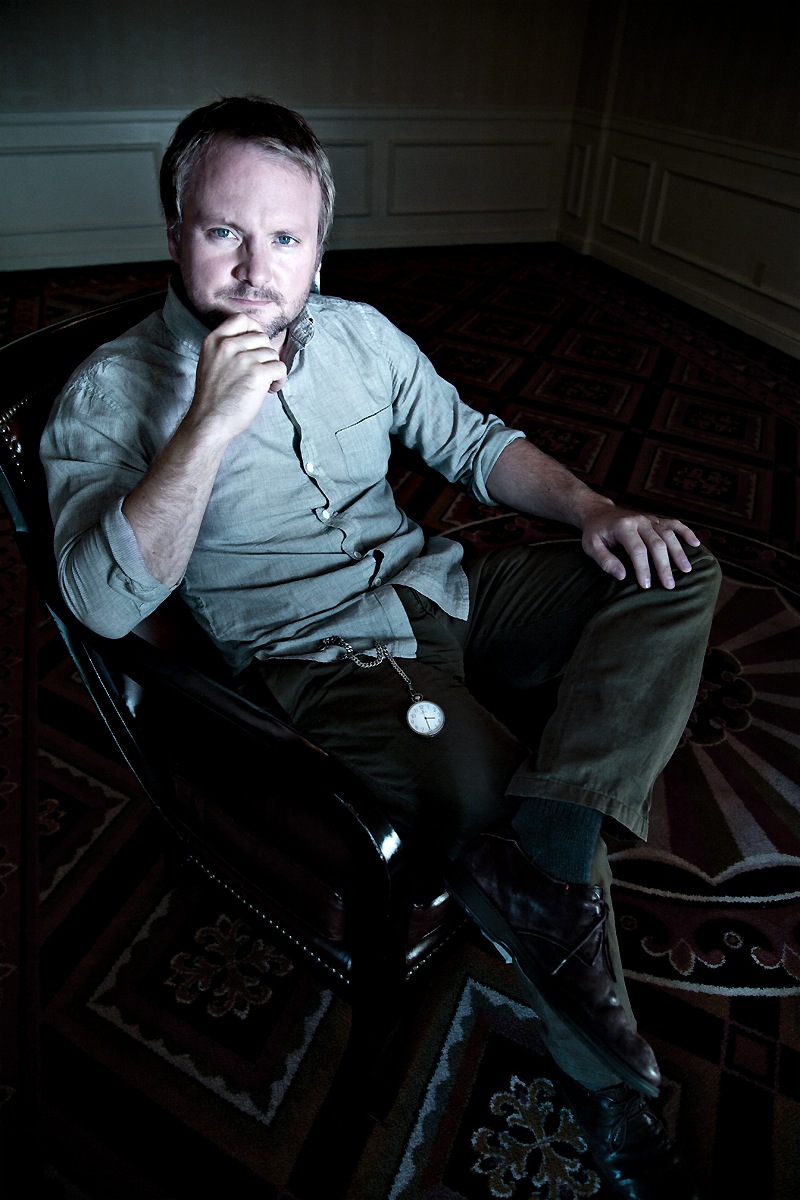Rian Johnson’s Feedback Loop

The sun is going down on an empty suite at the Four Seasons in Beverly Hills. Writer/director Rian Johnson settles into a brown leather chair, and after a day-long press junket, he doesn’t seem the least bit tired. “Don’t worry,” he assures us. “I only get to do these junkets every three or four years when I have a film out. This is the fun part.” The bespectacled Johnson, a USC film graduate, seems like the kind of guy you’d hang out with in a dingy dorm room watching Blade Runner or a Doctor Who marathon, and the Four Seasons setting seems a bit opulent for the humble director. His new film Looper, however, is a major leap forward in an already ambitious career that began with the noir-revisionist thriller Brick in 2005.
Equal parts time travel adventure and dystopian cautionary tale, the film combines all the best elements of Philip K. Dick and Ray Bradbury that Johnson has soaked up over the years, enlivened by Johnson’s unique wit and flare for genre reinvention.
DREW FORTUNE: When did the first spark of an idea hit for Looper?
RIAN JOHNSON: It was a while back, about 10 years ago. I wrote it as a short film that I never ended up shooting. I had the basic premise of it, it was a lot smaller, but all the basic ideas were there. I was in a phase were I was reading a ton of Philip K. Dick, and this weird little idea just came out. It wasn’t until after I did The Brothers Bloom that I took that little three-page script out and worked some of the bigger themes into it.
FORTUNE: There are a lot of striking, recurring images, especially the cornfield and the diner. Do you start with an image in your head, or is it the story that comes first?
JOHNSON: It’s the story, but sometimes the image informs the story. Sometimes in writing it, you’ll get just the image of something. There’s the story of the Coen Bros. having an image of gangsters in the woods in Miller’s Crossing. Sometimes you’ll get the image of something iconic in your head. It starts sounding very hippy-dippy when you talk about it in these terms, but usually when an image does pop up like that, there’s a reason it did. Even if you haven’t found it yet, it belongs somewhere in the story. Writing in a lot of ways feels more like excavation than construction. It feels like you’re uncovering this thing bit by bit, discovering what it is, instead of constructing it upwards.
FORTUNE: In terms of influences, Philip K. Dick seems like something most people get into in high school or college. Did you discover him later in life?
JOHNSON: Yeah, it must have been in my late 20s, I guess. I was about 27 or 28. I came upon him late and went through a phase where I just read all of his books, one after the other.
FORTUNE: That’ll put you in a weird headspace.
JOHNSON: That’s where this came out of, is that weird headspace! This is a product of that. This also probably owes more to the older sci-fi of Ray Bradbury, and the way he uses sci-fi concepts to amplify very human emotions. That, to me, is really what sci-fi is all about, and that’s what I was really trying to get at with this.
FORTUNE: It’s not necessarily the science, but the human emotions have to be there for it to work.
JOHNSON: Yeah, and that’s anything that works in terms of sci-fi. That’s the trick. It’s using the science stuff to amplify the human stuff, and not the other way around.
FORTUNE: The themes of childhood abandonment and salvation are also at the forefront of this story. Was this an attempt to exorcise any personal demons?
JOHNSON: [laughs] My wonderful parents! They didn’t go anywhere when I was a kid and were always around. It was really a way of getting at stuff that was really personal to me, but not directly. I didn’t have those experiences. I’ve had a mom who’s been consistent throughout my whole life. The whole movie was kind of about using violence as a problem-solving tool. That was kind of where the whole thing started. It was the notion of fixing a problem by finding the right person and killing them, versus solving a problem by making sure our kids are raised right. It’s using violence versus using actual constructive nurturing in the world and using love. That was more where the hope of salvation came at the end. It didn’t directly relate to anything in my head, but all of us have been abandoned in some form in our life. All of us have that feeling of some deficiency from our childhood. I think that’s a universal thing.
FORTUNE: It continues to haunt us throughout our lives.
JOHNSON: It always does, and that’s part of the appeal of time-travel movies: The notion of going back and fixing something. Memory is a form of time travel. That’s something we do during the course of the day, every single day. The idea of actually being able to physically adjust that and change it instead of being haunted by it is a really human thing.
FORTUNE: How important is the description writer/director for you? Could you ever envision yourself being a director for hire?
JOHNSON: I don’t know about director for hire. That sounds so cheap. It actually sounds like heaven to me to do somebody else’s script someday. Writing sucks, man. I think it’s terrible. Writing is not fun, and don’t trust anyone who claims to enjoy it. Liars! But, right now, I am writing my own stuff and I’m going to keep doing it for the foreseeable future. Even though it’s the least fun part of the process, it’s still the best thing in the world when you take something from the seed of an idea and take it all the way through to something that didn’t exist before. In some form or another, that’s what I’ve been doing since I was a kid making movies. That’s just kind of what I know.
FORTUNE: With sci-fi, you open yourself up to a very vocal fan base. Did you approach the project thinking, “If I goof this, these guys are going to eat me alive”?
JOHNSON: [laughs] That fear is always in the back of your head. I’m part of that fan base. I’m a sci-fi fan, and I guess you have to let go of some of that at some point, and realize that as long as you’re focused on telling a story that you care about, at the end of the day, that’s what really matters, even to hard-core sci-fi fans. I think too often people, especially when they’re making huge movies, can get spooked by the fanboy crowd. They think they have to do a checklist: We gotta have a hot chick in a rubber suit. We gotta have a certain amount of kills. We have to have cool vehicles and catchphrases. Being a fan and a fan of those movies, that’s the kind of shit we hate, when it feels like it’s just being done in order to please us. We want a movie that’s working on its own terms and doesn’t feel like it’s pandering to us. The fanboy community can smell in an instant, like smelling fear, when something was tailor-made in order to reach them as a demographic.
FORTUNE: I think to many males of a certain age, Bruce Willis was/is a hero, but you don’t necessarily portray him as such. How did you know that he’d be right for the role?
JOHNSON: That’s partly why I felt he was right for it. Besides being a tremendous actor, we’re used to seeing him show up in a movie and be the man with the plan, who’s going to find the bad guy, kill them and save the day. That plays specifically well into where his character ends up going. It’s almost like a martial-arts move that uses its own weight back against itself. It plays with your expectation in that way, hopefully in a way that’s really powerful.
FORTUNE: With Joseph Gordon-Levitt, you seem to have a nice Tim Burton/Johnny Depp artistic connection going on. Are you a quiet director with him, or do you guys get heated?
JOHNSON: We’re pretty low-key. We’re really good friends, and have stayed really good friends since we made Brick together. That kind of chills everything out, and there’s a really tight level of communication. When it’s someone you’ve hung out with and watched movies together, when you’re on set it feels like you don’t have to prove as much to the person, or demonstrate that you know your shit.
FORTUNE: I think his career could have gone a lot of different ways, but I really respect the path he’s chosen.
JOHNSON: It’s been cool seeing him on the rise. We’ve both changed a lot over the years, but the one thing that hasn’t changed with Joe is that he picks movies for exactly the same reason he did back then. Even when he’s doing a Batman movie, it’s because it’s something he’s excited about doing. It’s a story that he likes and people he likes working with.
FORTUNE: In 30 years, what’s the perfect future for Rian Johnson?
JOHNSON: Honestly, man, you come out of each movie just thinking, “God, if we can fool them into letting us make just one more, we can get it right.” So that’s entirely my mindset right now. I can’t think 30 years ahead. I’d probably fuck myself up if I tried. 30 years ago, I never could have imagined that I’d be able to be doing this. It’s best if I stay out of future plans and let time go on.
LOOPER IS OUT IN THEATERS TOMORROW.






